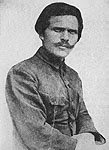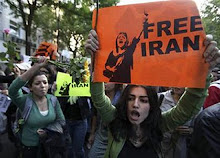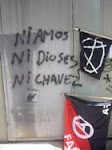Zum Geburtstag von Murray Rothbard ein Auszug aus The Betrayal of the American Right über seine Zeit in der Peace and Freedom Party Ende der 1960er:
"The peak of my political activity on the New Left came during the 1968 campaign. In the spring of 1968, my old enthusiasm for third-party politics was rekindled, albeit in a different direction. The Peace and Freedom Party (PFP) which had become (and still is) established in California, decided to go national, and opened up shop in New York. I found that the preliminary platform and the only requirement for membership contained only two planks: the first was immediate US withdrawal from Vietnam, and the second was some plank so vague about being nice to everyone that almost anyone, left, right, center could have endorsed it. Great: here was a coalition party dedicated only to immediate withdrawal from Vietnam and requiring no commitment whatever to statism! As a result, our entire libertarian group in New York poured happily into the new party.
The PFP was structured around clubs, most of them regional — such as the powerful West Side (of Manhattan) club, the hippie Greenwich Village Club, etc. One was occupational — a Faculty Club. Since there were very few actual faculty members in this very youthful party, the PFP generously widened the definition of 'faculty' to include graduate students. Lo and behold! On that basis, of approximately 24 members in the Faculty Club, almost exactly one-half were our people: libertarians, including myself, Leonard Liggio, Joe Peden, Walter Block and his wife, Sherryl, and Larry Moss. The legislative arm of the PFP was to be the Delegate Assembly, consisting of delegates from the various clubs. The Faculty Club was entitled to two delegates, and so we naturally divvied it up: one going to the socialists, and one to us, who turned out to be me.
At the first meeting of the Delegate Assembly, then, here I was, only in the party for about a week, but suddenly vaulted to top rank in the power elite. Then, early in the meeting, some people got up and advocated abolishing the Delegate Assembly as somehow 'undemocratic'. Jeez! I was just about to get a taste of juicy political power, when some SOBs were trying to take it away from me!
As I listened further, I realized that something even more sinister and of broader concern was taking place. Apparently, the New York party was being run by a self-perpetuating oligarchical executive committee, who, in the name of 'democracy', were trying to eliminate all intermediate social institutions, and to operate upon the party mass unimpeded, all in the name of 'democracy'. To me it smacked of rotten Jacobinism, and I got up and delivered an impassioned speech to that effect. After the session ended, a few people came up to me and said that some like-minded thinkers, who constituted the West Side Club, were having a gathering to discuss these matters. So began our nefarious alliance with the Progressive Labor faction within Peace and Freedom.
It later turned out that the PFP and its executive committee were being run, both in California and in New York, by the Leninist-Trotskyite Draperites, international socialists run by Berkeley librarian Hal Draper. The Draperites were the original Schachtmanites, Trotskyites who had rebelled against Trotsky as Third Camp opponents of both the United States and the Soviet Union. The New York party was being run by the Draperites, including as their allies a motley collection of assorted socialists, pacifists, countercultural druggies, and left-libertarians.
The opposition within PFP was indeed being run by the Maoist Progressive Labor Party (PL), who the Draperites feared were plotting a takeover. Actually, it soon became clear that PL had no such intention, but were only keeping their hand in, and were using the West Side Club to recruit candidate-members into PL. Both PL and the Draperites were keeping the structure loose while waiting for an expected flood of Gene McCarthy followers after Humphrey's expected Democratic nomination victory — a flood that, of course, never materialized. Hence the loose ideological requirement, and the fact that the platform was up for grabs. The alliance between PL and us libertarians was highly useful to both sides, in addition to cooperating in fending off Draperite dictatorship in the name of democracy. What PL got out of it was a cover for their recruiting, since no one could of course call us vehement antisocialists tools of Progressive Labor. What we got out of it was PL's firm support for an ideological platform — adopted by our joint caucus — that was probably the most libertarian of any party since the days of Cleveland Democracy. The PL people were pleasantly 'straight' and nondruggie, although quite robotic, resembling left-wing Randians.
The great exception was the delightful Jake Rosen, the absolute head of PL's fraction in the PFP. Rosen — bright, joyous, witty, and decidedly nonrobotic — knew the score. One of my fondest memories of life in the PFP was of Jake Rosen trying to justify our laissez-faire platform to his Maoist dunderheads:
'Hey, Jake, what does this mean: absolute freedom of trade and opposition to all government restrictions?'
'Er, that's the 'antimonopoly coalition'.'
'Oh, yeah.'
Jake, with more sincerity, joined us in opposing guaranteed annual income plans; he considered them bourgeois and 'reactionary'. About the only thing Jake balked at was our proposal that our caucus come out for immediate abolition of rent control.
'Hey, fellas, look, I'd love to do it, but we have commitments to tenant groups.'
Graciously, we let him off the hook.
With his personality, I didn't think Jake would last in PL. In addition he had already implicitly rebelled against party discipline. An obviously bright guy, Jake had accepted PL's orders to be 'working class' and became a construction worker; but he stubbornly failed to obey orders and move from the hip, cosmopolitan West Side of Manhattan to Queens. ('Jake, no construction worker lives on the West Side.') Indeed, a year or so after the breakup of the PFP, Jake left or was expelled from PL, and immediately went upwardly mobile, moving to Chicago and becoming a successful commodity broker.
As the McCarthy people failed to come in, conflicts within the party became ever greater, and the New York PFP began having almost weekly conventions. In addition to the PL Draperite conflict, the Communist Party set up its competing front in New York, the 'Freedom and Peace Party' (FPP), the existence of which began to confuse everyone, including the Left. Trying to put down the schisms, the California Draperites sent to run the New York party the supposedly legendary organizer Comrade Carlos, a Chicano whom the Draperite wing found to be charismatic, and to whom the rest of us took a strong dislike.
Although the PFP was clearly fizzling, the time finally came in late summer for nominations. The Draperites had decided on the ex-rapist Eldridge Cleaver for president, then head of the Black Panther Party. Cleaver displayed his contempt for the PFP by not showing up, and sending Black Panther sidekick Bobby Seale to sneer openly at his honkie admirers, who masochistically welcomed every sign of Panther derision. No one opposed Cleaver for the nomination; and since the PL bloc abstained, and since my libertarian colleagues did not make the early morning hour, it turned out that mine was the only vote cast against Eldridge Cleaver for president — not a bad legacy of my time on the New Left.
For the US Senate nomination, the veteran socialist-pacifist David McReynolds was the Draperite candidate, and I was persuaded to run against him to represent the PL-libertarian opposition. I agreed to run only because I knew darn well that there was no chance at all to defeat McReynolds.
I did not envy McReynolds's day in the sun. The Freedom and Peace Party was running a black candidate for Senate, and the Black Panthers did not wish to oppose a fellow Afro-American with the white McReynolds. The Black Panthers apparently pulled a gun on McReynolds, ordering him to withdraw his candidacy. What happened after that is hazy; I don't believe that McReynolds withdrew, but on the other hand I don't believe that either of these people made it to the ballot — and the 1968 election turned out to be the end of the PFP (except in California) and the FPP. And, oh yes, I heard later that Comrade Carlos had turned out to be a police agent."










Keine Kommentare:
Kommentar veröffentlichen